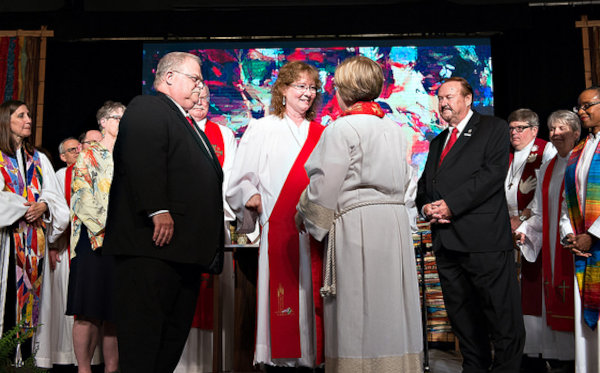Commission on the Status and Role of Women releases study of UM clergywomen.
MAGAELA C. BETHUNE
Commission on the Status and Role of Women
While The United Methodist Church (UMC) membership is comprised 58% of women (Goodrich, 2017), women made up 28.4% of UMC clergy positions in 2015. This is only a slight increase from 2003 and 2008 figures, which estimated clergywomen’s representation to be 24% (Moy, 2010). While women remain underrepresented in clergy roles overall, there is variation in how clergy are distributed by gender across the country. Further, there is regional variation in how clergywomen are compensated, in comparison to clergymen. Led by the General Commission on the Status and Role of Women (GCSRW), a recent study used 2015 nationwide data provided by Wespath Benefits and Investments to determine geographic trends in clergywomen’s compensation. Researcher Magaela C. Bethune used quantitative analytical methods to examine the influence of gender and geography on the composition and compensation of UMC clergy.
Demographics
In 2015, 11,235 U.S. clergypersons were included in a sample provided by Wespath; 28.4% were women, and 71.6% were men. The membership types of clergypersons included 43.4% full-time local pastors; 3.4% deacons; 50.3% elders; and, 2.9% associate members. Across the U.S., 35.5% of clergypersons were from the Southeastern jurisdiction; 20.7% North Central; 19.4% South Central; 16.9% Northeastern; and, 7.5% Western. On average, clergypersons were 54.2 years old, had a length of service of 19.8 years, and received an annual salary of $57,512.
Gender Distribution Across U.S.
Gender composition of UMC clergypersons in the U.S. differs across jurisdictions[3]. Gender composition of clergypersons also differs across conference areas[4], with the proportion of women ranging from 13.3% to 49.1%. Table 1 details the gender distribution of clergy across the country, highlighting key differences across all conferences, within and between jurisdictions. Clergywomen are underrepresented in the Southeastern Jurisdiction, which is the largest, while the Western and Northeastern Jurisdictions had relatively higher proportions of clergywomen, when compared to other jurisdictions. Clergywomen were statistically significantly underrepresented in the following annual conferences (relative to all other conferences): Alabama-West Florida, Holston, Indiana, Kentucky, Mississippi, North Alabama, Northwest Texas, South Georgia, Susquehanna, and Western Pennsylvania.
Clergywomen were underrepresented geographically – relative to other conferences within the respective jurisdictions – in the following conferences: California Pacific (relative to the Western Jurisdiction), Kentucky, North Alabama, and South Georgia (relative to the Southeastern Jurisdiction), Northwest Texas (relative to the South Central Jurisdiction), Susquehanna, West Virginia, and Western Pennsylvania (relative to the Northeastern Jurisdiction) and Indiana (relative to the North Central Jurisdiction).
2015 numbers for the Michigan Area: 30.6% Detroit Conference clergy were women; 33.6% West Michigan Conference clergy were women
Gender Pay Gaps
Women, who make up 28.4% of UMC clergy, received 24% of the $822 billion in compensation (e.g., salary, housing allowance, parsonage) paid to UMC clergy in 2015. With few exceptions, a significant pay gap characterizes most jurisdictions across all types of compensation. Tables 2 through 5 list the average salary, total compensation, housing allowance, and parsonage, respectively, by gender for each jurisdiction.
Most jurisdictions reflect substantial gender pay gaps across types of compensation.
Further analysis revealed that, in many annual conference regions, there are statistically significant differences in clergywomen and clergymen’s salary, housing allowance, parsonage, and/or total compensation. Tables 6 through 9 list the average salary, total compensation, housing allowance, and parsonage, respectively, by gender for each of the annual conferences. Noted are the conferences in which women receive significantly less compensation.
Average Salary comparison for 2015: Detroit Conference clergymen $55,753; $ 52,643 clergywomen
Average Salary comparison for 2015: West Michigan Conference clergymen $55,200; $49,534 clergywomen
Last Updated on November 2, 2023

